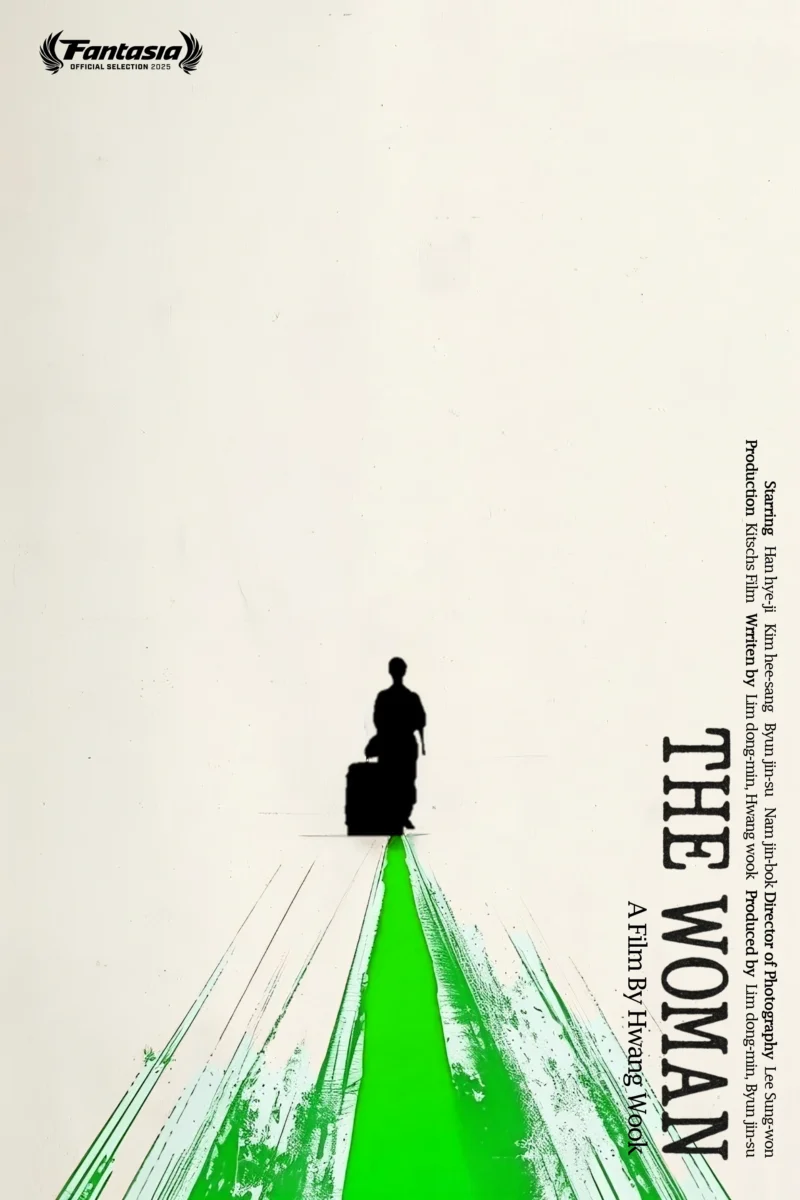- Film Title: The Woman Release Date: July 26, 2025
- Review by: Mother of Movies
- Director: Hwang Wook
- Writer: Lim Dong-min, Hwang Wook
- Cast: Han Hye-ji, Byun Jin-su, Kim Hee-sang, Nam Jin-bok
- Language: Korean (OV) with English Subtitles
This review peels back the layers of The Woman‘s unsettling narrative, discussing key plot points and thematic revelations.
Cracking the Code of Deception: Unmasking The Woman‘s Sinister Charm
From the quiet hum of a job interview to the jarring screech of a poisoned mind, The Woman (2025) isn’t just a film; it’s a cinematic misdirection, a slow-burning psychological thriller that will have you second-guessing every instinct. As Mother of Movies, I often find myself drawn to independent cinema, those passion projects where filmmakers pour their souls into crafting something truly unique. And The Woman delivers, not with grand explosions or CGI spectacles, but with the insidious power of suggestion and the unsettling whisper of a truly twisted mind.
This film feels less like a traditional narrative and more like a live-action reaction video, but the good kind, not the loud, obnoxious kind that makes you question humanity. It’s a journey of discovery, where every scene, every sound, every fleeting glance is a clue, a breadcrumb leading you deeper into a labyrinth of paranoia. You’re right there with the camera, seeing what it sees, hearing what it hears, and feeling the dread build. It’s the kind of film that sticks to your ribs, leaving a grimy residue of unease long after the credits roll.
Setting the Unsettling Scene: Everyday Absurdity
Our journey begins with a seemingly demure woman, short-haired and quietly spoken, navigating the mundane absurdity of a job interview. It’s a familiar scene, punctuated by those rhetorical questions that make you wonder if anyone truly listens. Yet, even here, the film injects a subtle discord: a man casually eating in the background, a silent judgment on the very standards being imposed. This initial unease quickly escalates when our protagonist ventures out to collect a free vacuum.
What starts as a relatable anecdote of online bartering quickly devolves into a bizarre encounter with a “super weird” man. His tale of his mother dying from cyanide-laced random food is the first red flag, a chilling foreshadowing that echoes the film’s later, darker turns.
The physical struggle over unwanted strawberries, the bystander’s intervention, and the man’s almost animalistic consumption of the smashed fruit (like some sort of deranged raccoon) immediately establish a world where the ordinary is perpetually off-kilter. When the woman discovers a suspiciously long wad of black hair in the vacuum, a drain event in miniature, and promptly discards the whole thing, the tension thickens.
Her hushed phone call to her mother, revealing a life on the run and a deep-seated concern for her safety, paints a picture of a victim, a woman constantly on guard. The subsequent news from Mapo police station, the bystander suicide by cyanide in a vitamin drink, confirms our initial fears. This is a world where danger lurks in the most unexpected places, where even a simple act of goodwill can lead to fatal consequences.
The Unveiling: When Perception Shifts in The Woman
As the narrative progresses, The Woman masterfully employs cinematic techniques with immaculate clarity. The screechy sound effects and jarring flashes of bad dreams are not just stylistic choices; they are a visceral representation of the protagonist’s fractured reality, or perhaps, our own. When the strange man reappears, fixated on the discarded vacuum and its missing charger, the atmospheric dread becomes almost unbearable. The camera’s POV view often narrows our perspective, showing just enough to incite dread without revealing the whole picture, brilliantly mirroring the woman’s own secretive existence. We’re extremely invested both in why the woman is so secretive and what this man might be doing, convinced we’re witnessing a terrifying cat-and-mouse game where she is the prey.
But then, the film pulls the rug out from under us. The cop, initially dismissive, becomes increasingly suspicious. And then, the seismic shift: with one chilling line,
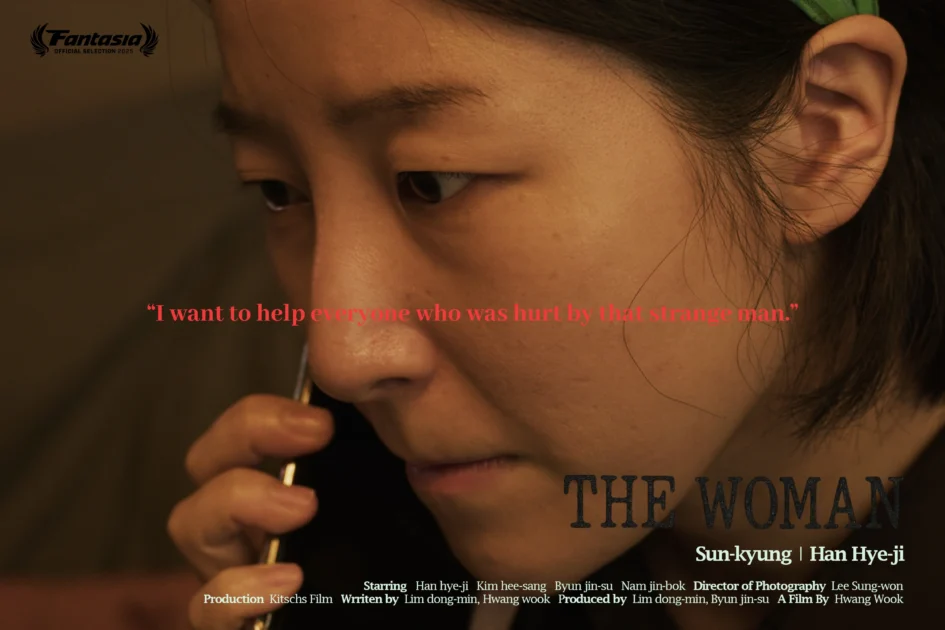
“She is the well-known psycho in the area.”
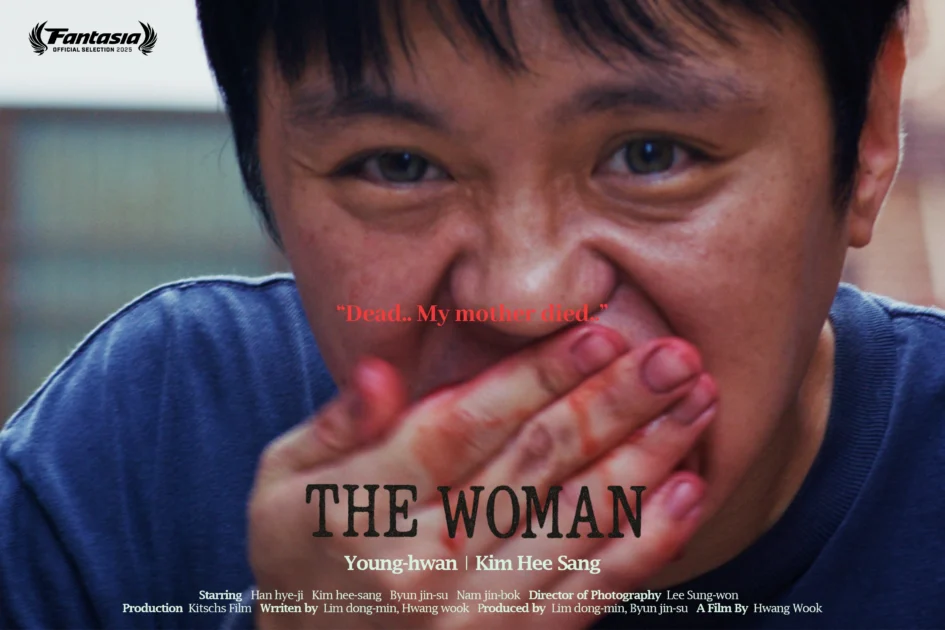
But there is nothing to indicate this mousy woman is anything except another victim of wrong place at the wrong time, accompanied by those unnerving high-pitched reed instruments and tinkling piano. But then our protagonist smiles. It’s not a friendly smile; it’s sinister, a chilling revelation that flips the entire script. Her visit to a church, punctuated by the same unsettling musical motif, and the hostile reception at the wake for the deceased man, confirm a dawning horror.
Her behaviour is disconnected from events, bordering on joy as the arguments erupt around her. This is where The Woman truly shines, showcasing the underbelly of human nature, the subtle ways perception can be manipulated, and how easily we can be led astray. It’s a stark reminder of how insidious gaslighting can be, not just in personal relationships, but in how we perceive events and assign blame.
Strangle The Mystery: The Woman‘s Dark Heart
The filmmaking itself becomes complicit in this unsettling narrative. The camera elicits a purposeful vantage point, like starting a scene from black before focusing on her butt as she walks into the next room. Sometimes the camera jolts around, becoming a destabilising mechanism, serving to disorient the viewer, mirroring the chaos around her. The narrow views, often only showing things in range, make us question what we’re missing. What unseen horrors lurk just outside the frame?
As she reads articles about criminals in a digital prison and then casually leaves with the same type of suitcase as a dismembered body was found, can the conclusion really be confirmed? The chilling question hangs in the air: Who’s pulling the strings here? The Woman dissects the very mechanisms by which it’s perpetrated, showcasing a chilling portrayal of narcissistic control and calculated manipulation. It’s a dark mirror reflecting the cults of personality and machinations that thrive on misdirection and manufactured reality.
THE WOMAN 2025 is rated
4.5 Unseen Puppeteers Pulling Strings out of 5.
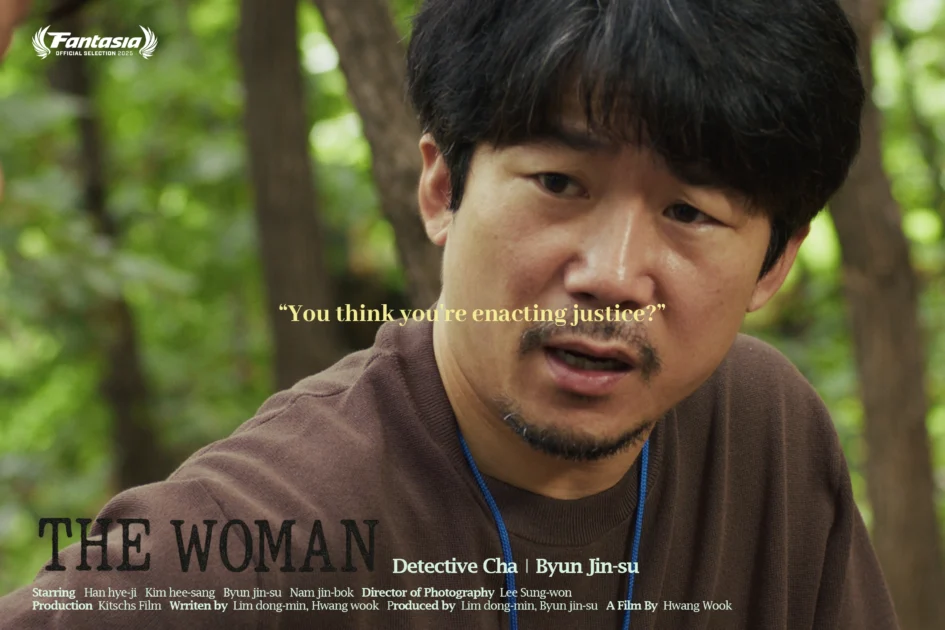
The Woman 2025’s Internet Buzz
Whispers across the cinematic forums suggest The Woman has sparked intense debate regarding its portrayal of psychological manipulation and the subversion of classic thriller tropes. Many viewers are reportedly discussing the film’s bold choice to depict a different kind of antagonist in such a chillingly calculated light, which has prompted conversations about societal perceptions of victimhood and villainy. The film’s unique sound design and the jarring shifts in perspective are also frequently highlighted as key elements contributing to its unsettling impact.
A Gripping Neo-Noir Journey into Suspicion and Paranoia
South Korea’s THE WOMAN 2025, screening at this year’s Fantasia Film Festival 2025, marks a bold genre leap for director Hwang Wook, known for his award-winning neo-Western black comedy MASH VILLE. Trading in the dusty plains for a claustrophobic psychological thriller, Wook’s latest is a masterclass in atmosphere and tension that keeps you guessing until the final frame. More international films you might like are Other (O.T.H.E.R) 2025 / Handling the Undead.
Spoiler Section – The Woman 2025 Spoiler Section is Only For People Who Hate Surprises
The film’s final act is a relentless unraveling of truth, or rather, the truth according to The Woman. We learn that the “strange man” was perhaps more traumatized than suspicious, his nervous vitamin drinking now seeming a symptom of his own internal battles rather than an immediate threat. The emergence of a “community sleuth” and the terrified local shopkeeper calling her “that crazy bitch” who caused trouble in his past, solidifies the horrifying realization: our protagonist isn’t a victim; she’s a predator, a master manipulator. The question isn’t whether she’s innocent, but “Is she just planting information to incite suspicion on others? Taking opportunities to lead investigations in different directions, causing others to be accused?” And what’s inside her suitcase?
The Woman cycles back to the start, the job interview, leaving us to ponder the very nature of deception, the endless loop of her predator-prey dynamic. It’s a film that demands a second watch, not just to pick up on missed clues, but to fully appreciate the insidious brilliance of its narrative reversal. It’s a chilling reminder that sometimes, the most dangerous wolves wear the quietest, most demure sheep’s clothing.
The Woman
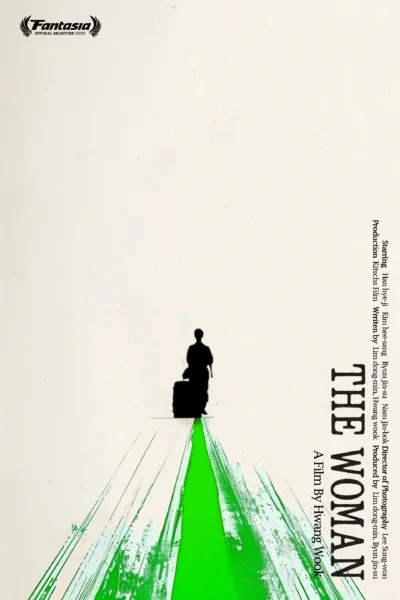
Director: Hwang Wook
Date Created: 2025-07-26 21:55
4.5

